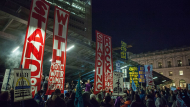State Department Releases Supplemental Environmental Analysis on Keystone XL Tar Sands Oil Pipeline
WASHINGTON, D.C.-The U.S. State Department today released a Supplemental Draft Environmental Impact Statement (SDEIS) for the controversial Keystone XL pipeline, which would carry highly polluting tar sands oil from Canada across six U.S. states to refineries in Texas.
The supplemental environmental analysis had been requested by communities that could be impacted by the pipeline, as well as by members of Congress, and the U.S. Environmental Protection Agency. The EPA gave the State Department's first Draft Environmental Impact Statement its worst possible rating, "category-3 inadequate," for lacking detailed information about key environmental concerns, including pipeline spills, impacts on global warming, and pollution of air and water.
Alex Moore, Dirty Fuels Campaigner at Friends of the Earth, had the following statement:
"The State Department's first draft environmental analysis was so inadequate that it had no place to go but up in its second attempt. Unfortunately, the American public is still not getting a complete picture of the many serious dangers that this mega-pipeline would pose.
"On first reading, we are concerned that the State Department has still not done a serious and thorough analysis of significant dangers, including the safety of tar sands oil pipelines and the pollution caused by tar sands oil production.
"The State Department has taken an important step in categorically stating that tar sands oil has far higher greenhouse gas emissions than do other forms of oil used in the U.S.-this finding alone should lead the State Department to reject the permit for this pipeline.
"We are disturbed to see that the State Department is neither giving enough time for public comments nor has it scheduled any public hearings. This is not in line with President Obama's commitments to transparent and accountable government. The American people have a right to speak out about this risky dirty oil project."
When releasing the SDEIS, the State Department indicated that it will accept public comments for only 45 days and did not announce any public hearings.
In a letter sent to Secretary of State Hillary Clinton on April 4, 2011, thirty-two local and national organizations, ranging from Friends of the Earth and the Sierra Club to the Nebraska Farmers Union and Dakota Rural Action, called on the State Department to hold a 120-day public comment period and public hearings in states along the pipeline's route.
The Supplemental Draft Environmental Impact Statement for the Keystone XL pipeline is available here: http://www.keystonepipeline-xl.state.gov/clientsite/keystonexl.nsf/04_KX...
The letter sent by 32 groups to Secretary Clinton demanding a longer comment period and hearings is available here: http://www.foe.org/sites/default/files/Letter-Clinton-public-comment-SEI...
The following are excerpts from the SDEIS section stating that tar sands oil has far higher greenhouse gas emissions than other forms of oil used in the U.S.:
Page 239: "As shown in Figure 3.14.3-1, the NETL WTW GHG emission estimates from gasoline produced from WCSB oil sands-derived crude oils are 17 percent higher than that the GHG emission estimates for gasoline produced from the average mix of crude oils consumed in the United States in 2005, and are approximately 19, 13, and 16 percent higher than GHG emission estimates for Middle East Sour, Mexican Heavy (i.e., Mexican Maya), and Venezuelan20 crude oils, respectively (NETL 2009)."
Page 243: "Despite the differences in study design and input assumptions, it is clear that WCSB crude oils, as would likely be transported through the proposed Project, are on average somewhat more GHG-intensive than the crudes they would displace in the U.S. refineries. ... he life-cycle GHG emissions associated with transportation fuels produced in U.S. refineries would increase with increased imports of WCSB crude oils."

